Naked. Raw. Alone. Unencumbered, unpretentious, unadorned. Stand this way in front of a full-length mirror, take and release a deep breath, and observe. Observe your thoughts as you observe your body. This is, after all, an exercise in body-acceptance and embracing midlife beauty.
Notice the thoughts you have when you look at your body.
- Nasty thoughts one has about her own body are often disgust-based: Yuck!
- My body is disgusting!
- I need to fix this ASAP!
If you have a negative relationship (especially one that is disgust-based) with your body, it’s no wonder you question if body acceptance for midlife women is possible. That is exactly what Diet Culture wants you to believe.
When we look in the mirror, it’s often with a critical eye. We search for flaws and compare our reflection to some kind of ideal that seems forever out of reach.
For many women, especially in midlife, body acceptance can feel like an uphill battle. The struggle isn’t about vanity, but about deeper issues: self-worth, societal pressures, and changing identities.
However, there is actually a way to find peace with our bodies, even if we don’t love every inch of them.
What Is and Isn’t Body Acceptance?
First, let’s clarify what body acceptance is and isn’t.
Body-acceptance is NOT about adoring every part of your body all the time.
It’s not about looking in the mirror and feeling ecstatic about every wrinkle, stretch mark, or pound.
Instead, body-acceptance is about finding a way to coexist peacefully with your body.
It’s about recognizing your body’s worth and treating it with respect, even if you have aspects you’re not thrilled about.
Isn’t that also true in relationships we have with people? You may not like every single feature of their personality, but that’s ok. You still respect one another.
Body-acceptance isn’t a passive resignation to “flaws,” nor is it a lack of desire for health.
So what is it?
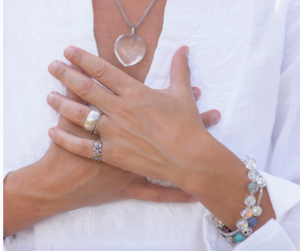
It’s an active choice to value yourself as a whole person.
I, we… all of us are so much more than our physical appearance.
Body-acceptance is about dismantling the internalized standards that dictate you must look a certain way to be worthy of respect and love.
It’s about understanding that your body is what carries you through life. You and your body are therefore worthy of care and compassion.
(Cue the meme “your weight is the least interesting part of you.”)
Other Ways to Feel About Your Body

Body-acceptance is not the only way to feel about your body. There are a bunch of alternative perspectives and emotions that you (yes you) could experience:
-
Body Neutrality
This is the idea that you don’t have to love your body, but you also don’t have to hate it. You can just exist in your body and focus on other parts of your life.
-
Body Gratitude
This involves appreciating what your body does for you. For example, it allows you to hug your pet, walk through pretty landscapes, dance, or breathe deeply.
Focusing on these sorts of things can foster a sense of gratitude.
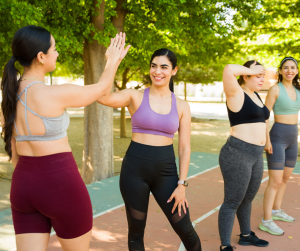
-
Body Respect
In other words, treating your body with dignity and giving it proper nourishment, rest, and movement, regardless of how you feel about its appearance.
Appearance is only a fraction of your overall relationship with your body. Thoughts, feelings, behaviors, perceptions are also part of your body image.
What Gets in the Way of Body Acceptance?
Several obstacles hinder body acceptance:
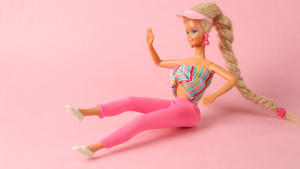
- Societal Pressure: Media and cultural norms glorify a standard of beauty that’s unattainable and unrealistic. These pressures make it difficult to feel good about our own unique bodies.
- Internalized Criticism: Over the years, we absorb critical messages about our bodies from family, peers, and media. Internalized voices become constant and loud. The negative self-talk undermines self-esteem.
- Perfectionism: The desire to meet a perfect standard can lead to chronic dissatisfaction. The pursuit of perfection is an endless cycle, as perfection itself is an illusion. It does not exist, even in nature. Have you ever seen a perfect snowflake or flower petal? (If so, please lmk. I haven’t seen anything real that is perfect.)
- Comparisons: Comparing ourselves to others, whether friends, celebrities, or even our younger selves, can erode self-worth and make acceptance out-of-reach. Things (furniture, appliances, papers) change (and age) over time.
- Fear of Judgment: Worrying about how others perceive us can prevent us from embracing our bodies as they are. The fear can be paralyzing
If You Accepted Your Body, What Would Be Different?
Imagine a life where you accepted your body. How might it change your day-to-day experiences and overall well-being?

- Increased Confidence: Accepting your body leads to greater self-confidence. When you’re not fixated on perceived flaws, you can focus more on your strengths and abilities…and on pleasure, joy, and fun.
- Better Mental Health: Reducing negative self-talk associated with body image can alleviate stress, anxiety, and depression and lead to greater well-being.
- Improved Relationships: When you’re comfortable with yourself, it’s easier to form and maintain healthy relationships. You’re less self-conscious and more present to others. Being present, truly in the here-and-now, can be a delight!
- Freedom from Diet Culture: Accepting your body liberates you from the cycle of restrictive diets and constant weight-loss pursuits. You can focus on nourishing your body and enjoying food without guilt. F* the rinse-and-repeat cycle Diet Culture teaches us to live by.
- Enhanced Self-Care: When you respect your body, you’re more likely to take care of it through nourishment, joyful movement, and adequate rest. Self-care becomes an act of love, not punishment. You don’t want to punish your one-and-only body.
Moving Beyond the Standard Rhetoric: Unique Perspectives on Body Love
The common rhetoric around body-love revolves around positive affirmations and radical self-love. While these can be powerful, they don’t resonate with everyone, especially those struggling to feel any kind of affection for their bodies.
Here are some unique approaches to consider:
- Mindful Movement: Engage in physical activities that you enjoy and that make you feel happier. This could include dancing in your home, yoga, swimming, or walking in nature. Focus on how these activities make you feel rather than how you look or how they might change your appearance.
- Creative Expression: Use art, writing, or other forms of creative expression to explore and express your feelings about your body. This can be a therapeutic way to process negative emotions and develop perspective.
- Body-Function Appreciation: Spend time focusing on what your body allows you to do each day. Make a list of the ways your body supports you, from the mundane to the extraordinary. Reflect on these regularly.
- Support Networks: Surround yourself with a supportive community that promotes body acceptance. Share your journey with friends or join groups where you can connect with others who understand and validate your experiences.
- Professional Help: Sometimes, working with a therapist (hello!) can be incredibly beneficial. A therapist with a specialty in body image can help you navigate deep-seated body image issues and develop healthier coping mechanisms.
Why not make peace with your body and treat it with the respect it deserves? Why waste more time on body-hatred?
You CAN do this. It’s okay to have days when you struggle and days when you feel more accepting than on other days.
The key is to continue nurturing a relationship with your body: One that is built on kindness, respect, and understanding.
If not now, then when?
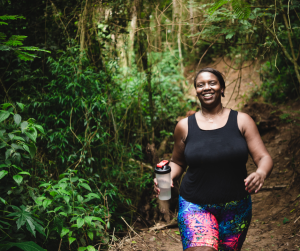
For women in midlife, body acceptance is particularly important. Our bodies undergo changes that challenge our self-perception and our sense of who we are and want to be.
Embrace body changes as part of your life-story, a testament to the experiences and wisdom you’ve accumulated.
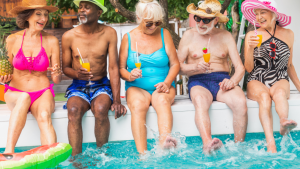
Your body is your lifelong companion. Why not treat it with the same kindness and respect you offer a close friend? (At least give it a try.)
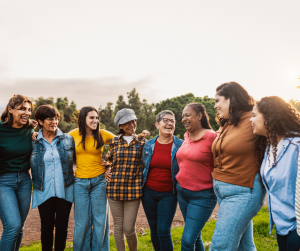
What if the purpose of being in your body is so you can experience the world and truly live?
Fact: You don’t have to love (how you perceive) your body. That’s just a lie we’ve been told and sold.
And a lie to unlearn.
Your body contains you.
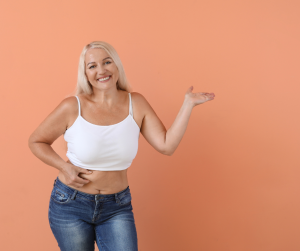
Read that again: Your body contains you.
That is your splendor.
Body acceptance is possible and important, at midlife especially.
Dr. Elayne Daniels is an international coach, consultant, and psychologist specializing in eating disorders, body image, and High Sensitivity. She is anti-diet and Intuitive Eating-certified and believes we humans are highly capable of transformation. Contact her here for more information.


